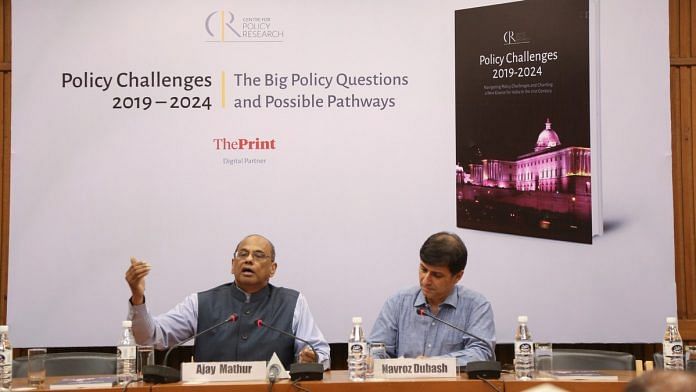New Delhi: Thinking of business models that can address the problem of crop waste and monetise it, treating air pollution as a public health emergency, and ensuring reliable access to electricity were some of the points raised by environmental experts Navroz Dubash and Ajay Mathur at Centre for Policy Research’s (CPR) ‘Policy Challenges: 2019-2024’ seminar Wednesday.
The two-member panel, discussing on ‘Climate, Energy and the Environment’, talked about India’s shifting policy requirements when it comes to electricity. ThePrint was the digital partner of the event.
“The policy emphasis for many years has been to build as many power stations as possible, and we did that successfully. Then, the question of access became a priority in the last 5-6 years,” said Mathur, Director General of TERI (The Energy and Resources Institute).
“Now, the third policy question should be how to give every household reliable electricity,” he added.
Also read: ‘Well-regulated markets, citizen participation critical for future of the Indian state’
Climate change, air pollution — the menaces of our times
Climate change will exacerbate problems that already exist, namely water and land distribution, Mathur said.
Stressing on the importance of having mechanisms for storing water locally, Mathur said, “Banks need to provide loans to purchase pipes that will connect one farm to another.”
The duo also discussed the need to urgently find solutions to the complex problem of air pollution.
“Air pollution in India is now a public health emergency and needs to be treated as such”, said Dubash, researcher at the CPR.
The National Clean Air Programme is a proposed solution that will make for a useful start, but it has its share of shortcomings, said Dubash.
Dubash has co-authored some of the papers in CPR’s policy compendium.
The compendium titled ‘Policy Challenges 2019-2024: Navigating Policy Challenges and Charting a New Course for India in the 21st Century’ is a compilation of papers by several scholars on various policy matters, including foreign and national security, economy, urbanisation and welfare, among others.
Creating business models to monetise crop waste
Stressing on the need for community participation, Mathur said Resident Welfare Associations could play an important role in preventing anything that openly flouts air quality laws.
“The second aspect is to figure out how do we create business models that address the problem of air pollution,” he said.
Mathur went over the multiple existing mechanisms to utilise crop waste in a more productive fashion. “One method is to convert crop waste and supply to power stations, and another is to use them as fuel to power cold storages,” he said, adding, “Things which monetise waste will be useful.”
ThePrint is a digital partner of Centre for Policy Research’s Policy Challenges 2019-2024 conversations.
Also read: India’s foreign policy needs strategic autonomy and more ambition, experts say



